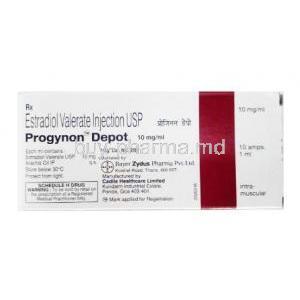PROGYNOVA Injection: Its Action and Effects
Progynova has estradiol valerate, a prodrug of the natural human estradiol. During the menopause ovaries decrease producing the estradiol. Although the menopause is a natural condition, it often results in distressing symptoms that happens due to lack of the hormones produced by the ovaries.
Moreover when the estradiol lacks in body, it results in thinning of the bones. In some women this effect may be extensive (postmenopausal osteoporosis) resulting in fractures of the bones in later life.
Progynova injection is used to substitute the hormone estradiol that the body fails to create after menopause. The estradiol relieves annoying symptoms such as nervousness, irritability, dizziness, hot flushes, sweats, sleep disturbances, headaches, as well as involuntary loss of urine, vaginal dryness and burning, and pain during sexual intercourse.
If progynova is used for a longer period, it can cause excessive development of the lining of the womb and, as a result, can increase the incidence of womb cancer. An additional administration of a progestogen can be used to reduce this risk. It causes regular shedding of the lining of the womb and, therefore, menstruation-like bleeding. If you have not removed the uterus/womb by surgery, your doctor should recommend a progestogen hormone for you to take while you are using this medication.
Effects
Administration of this drug to nursing mothers has brought a reduction in the amount and quality of the milk. Mothers receiving this drug have been tested which showed estrogens in their milk. So estradiol should not be administered to a nursing woman. A study was made on geriatric patients where most women (80%) were new to this hormone therapy.
They were given conjugated estrogens plus medroxyprogesterone acetate together. They showed a double increase in the risk of developing dementia. The majority of patients reported an Alzheimer’s disease.
Children who were treated with a large amount of dose for a longer period accelerated epiphyseal closure, resulting in short adult stature. Using p rogynova injection before the completion of physiologic puberty also experience premature breast development and vaginal cornification, and may occasionally induce vaginal bleeding in girls. In boys, this therapy may affect the normal pubertal process.
More common side effects associated with progynova are headache, high blood pressure, anxiety, back pain, breakthrough bleeding, breast tenderness, sinus problems, constipation, depression, flu-like symptoms, hot flushes, insomnia, indigestion, nausea, neck pain, skin redness and irritation at the site of the patch, upper respiratory tract infection, weight increase. When estrogens and progestins were used by postmenopausal women, it increased the risk of breast cancer.
A number of postmenopausal women receiving estrogens showed a 2- to 4-fold increase in the risk of gallbladder disease. There is potential that estrogen therapy may cause severe hypercalcemia in patients with breast cancer and bone metastases. If it occurs, use of the drug should be discontinued and suitable measures taken to reduce the serum calcium level.
There are some adverse impact has been noticed. But their occurrence time has not been studied. These are flushed, dry skin; fruit-like breath odor; increased hunger; irritability; abnormal turning out of cervix; changes in appetite; dull ache or feeling of pressure or heaviness in legs; fatigue; large amount of triglyceride in the blood; leg cramps; patchy brown or dark brown discoloration of skin; poor insight and judgment; problems with memory or speech.

